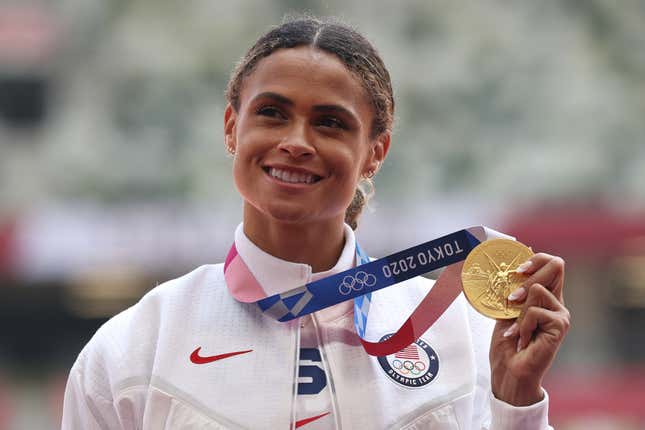
On the same day we learned that both Simone Biles and U.S. shot-putter Raven Saunders suffered personal tragedies during the Tokyo Olympics—Biles’ aunt died just two days prior to her competing in the balance beam event; Saunders lost her mother shortly after she won the silver medal in the shot put—came the news that Black excellence remained on display during the 2020 Summer Games.
While Gwen Berry, whose national anthem protests have drawn significant backlash, failed to medal in the hammer throw on Tuesday, wrestler Tamyra Mensah-Stock became the first Black woman to win Olympic wrestling gold for the United States. And much like Biles and Saunders, the 28-year-old suffered through her own personal tragedy during her Olympic journey. While she was still in high school, she lost her father in a car accident as he was driving home from a wrestling meet.
“He would have been the loudest one here,” she said after becoming an Olympic champion. “He would have been so proud.”
But that wasn’t the only challenge she faced along the way. NPR explains how her road to Olympic gold was about the furthest thing from easy:
Her first match was against Sara Dosho of Japan—the 2016 Olympic gold medalist and 2017 world champion. She then moved on to China’s Feng Zhou, who pulled out a surprise win against Mensah-Stock in early 2020. Both of those elite opponents failed to score a point against the American in Japan, who beat them each by a 10-0 score.
In her semifinal match, Mensah-Stock faced another former world champion in Alla Cherkasova of Ukraine. After falling behind, she recovered late to win 10-4.
The gold medal caps a long quest for Mensah-Stock, who finished first in U.S. Olympic team trials ahead of the Rio Olympics but was unable to compete because the U.S. had not qualified to earn a spot in her weight class. She traveled to Brazil for the Games but only as a training partner.
“I’m feeling very happy and I keep trying not to cry, but it keeps happening,” she told reporters. “I just want to go into a dark room and cry, but I’m crying from joy.”
Also collecting Olympic gold was U.S. sprinter Sydney McLaughlin, who broke her own world record by almost half a second after completing one of the fastest 400-meter hurdles races in Olympic history, per USA Today:
McLaughlin crossed the finish line in 51.46 seconds, setting a bar that everyone else will now try to clear. Muhammad, 31, also broke the previous world record. And Femke Bol of the Netherlands, who took bronze, finished just .13 away.
In order to do so, McLaughlin had to outsprint teammate Dalilah Muhammad, who just so happened to be the reigning world champion and an Olympic gold medalist in her own right. And after coming in second place to McLaughlin, the two commemorated their epic duel by embracing at the finish line.
“I’m absolutely delighted,” McLaughlin, 21, told reporters after her win. “What a great race. I’m just grateful to be out here celebrating that extraordinary race and representing my country.”
With the coronavirus still very much a thing, I can’t even imagine what it must be like to compete under these circumstances. But shoutout to every single one of these amazing athletes for performing at the peak of their abilities while making Olympic history along the way.

